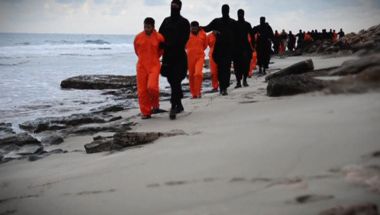Libya killings: traumatised families gather to mourn their dead

Thousands of traumatised mourners gathered on Monday at the Coptic church in al-Our village south of Cairo, struggling to come to terms with the fate of compatriots who paid a gruesome price for simply seeking work in Libya.
Thirteen of 21 Egyptians beheaded by Islamic State came from the impoverished dirt lanes of al-Our, violence that prompted the Egyptian military to launch an air strike on Islamic State militant targets in Libya.
One man was in denial at the death of his son.
"Oh Kerollos, this is your wedding party ... I'm very sorry my son, because I did not have enough money to keep you from going to this place," he moaned.
Black banners hung on the walls of the Church of the Virgin Mary, proclaiming "Egypt rise up, the blood of your martyrs is calling for you to take revenge". Relatives fainted from grief.
Pictures of the victims were laid out beside images of Jesus. There were no coffins because the bodies of the victims, who were dressed in orange jumpsuits, forced to kneel on a beach and were then beheaded, were not returned home.
Sheikhs from al Azhar, Egypt's main centre of Islamic learning which condemned the beheadings, joined the mourning.
Many could not fathom why men who simply wanted to support their families back home would be butchered by Islamic State, the ultra-orthodox militant group that took over parts of Syria and Iraq and has now expanded its operations to Libya.
"They are not humans. They are monsters. They are holding unarmed people (who) were going to bring bread for their families," said Father Tawadros, pastor of the church.
Facing grim economic prospects at home, many desperate young Egyptians seek jobs in Libya, a country sliding into lawlessness where armed groups battle for control and dozens of their compatriots have been kidnapped.
Given Egypt's high unemployment rate, other men are likely to keep streaming into Libya.
Family members spoke of 23-year-old Milad Sameer Majli who had only been in Libya 15 days before he was kidnapped.
Father Sami Naseef said the stories of those killed were all similar. They were men who were down on their luck and struggling to make ends meet for their families.
Naseef spoke of Abanoob Atiya, 23, who had a technical degree and used to earn 320 Egyptian pounds ($42), only to give most of it to his siblings and the rest went towards transport.
"After he finished his military service, he decided to go to Libya to earn money for his family," Naseef said.
He never made it home.











